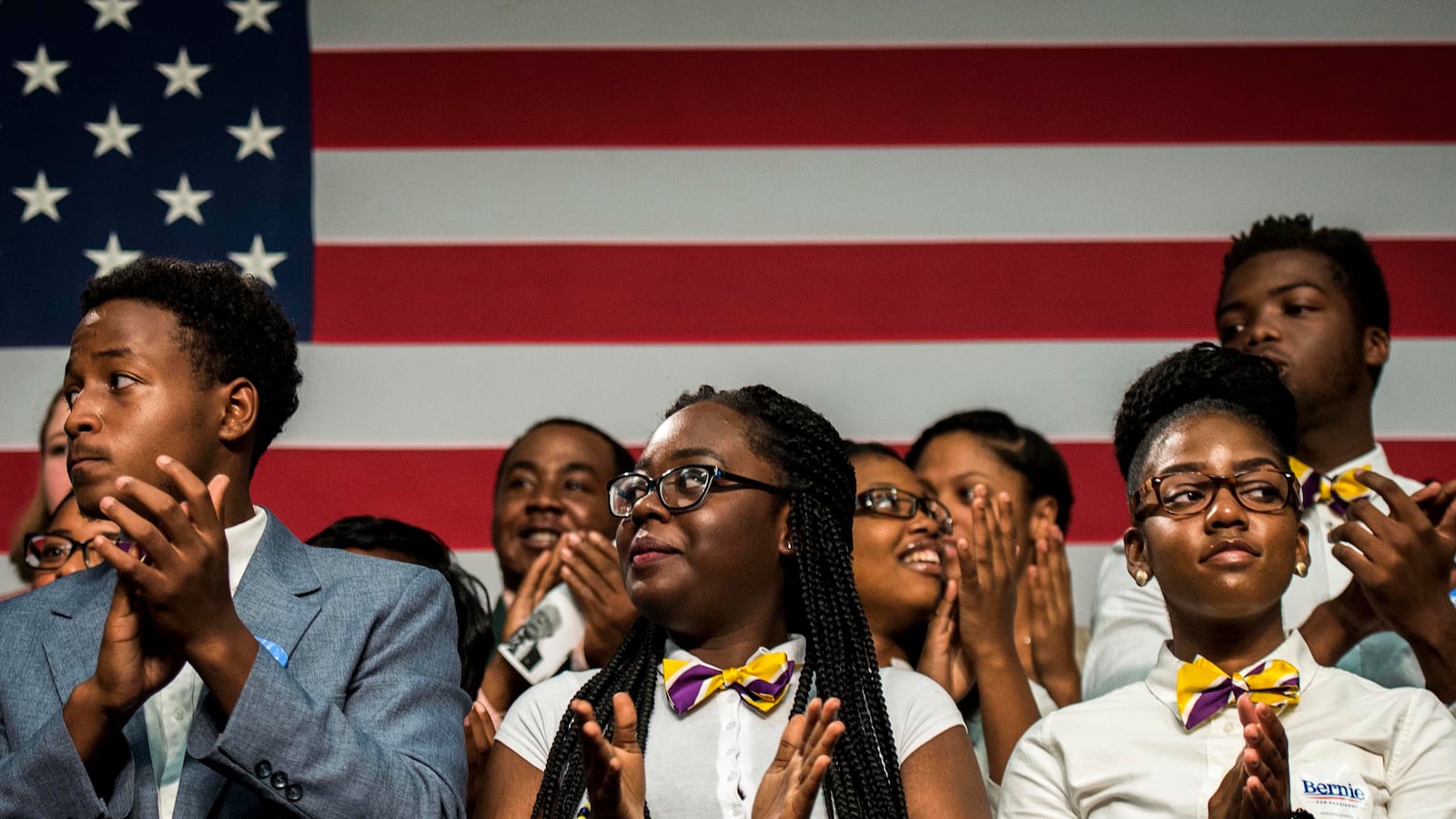Coming off his near-upset in the Iowa caucus and his massive win in New Hampshire, polls (PDF) are showing that more voters nationally are “feeling the Bern,” with Bernie Sanders now appearing to have the momentum against Hillary Clinton. These polls seem to confirm two theories.
First, the enthusiasm gap that many of us have long written about and that Hillary Clinton struggles with is very real.
Second, not caring about which candidate is actually electable might be one of the greatest forms of privilege there is. This is one reason why despite being more progressive than Clinton in some areas, Sanders has struggled to gain traction with black voters. Because ignoring whether a candidate is actually electable is a luxury most minorities simply can’t afford.
Here’s what I mean.
Every voter I’ve ever met has fallen into three camps: Those who see voting as a civic duty, those who only do it when they’re really inspired, and those who view it as an act of survival. For those who view it as a civic duty, voting is on par with volunteering for charity—something good, responsible people do regularly but not necessarily something they believe will immediately impact their lives. But they may believe that voting for a candidate who cares about climate change today could possibly have some impact on the world one day, like when their grandchildren are here.
We have all met at least one person who falls in the only when they’re really “inspired” camp. They only vote when a candidate makes their heart sing by saying something witty on The Tonight Show or giving one great speech.
Then there are those who vote for survival. That’s the person who votes, and gets family members to vote, to try to overturn a Stand Your Ground Law in her state, because she knows more than one unarmed teen in her community who was killed because of such a law. That kind of voter doesn’t have the luxury of waiting to be “inspired” by a candidate or to think long term about how their vote might make a difference a decade from now.
Which is why the battle between Bernie and Hillary is actually much bigger than the two of them. It’s a larger debate the progressive movement has struggled to settle within its broad coalition for years over whether considering electability is in itself a moral issue on par with the many policy issues voters and parties must consider.
For years there was a saying in Democratic circles: “Democrats want to fall in love with a candidate. Republicans fall in line.” (Obviously Donald Trump’s supporters didn’t get the memo this year.)
Hillary Clinton continues to struggle because she’s not a candidate who inspires love; admiration perhaps, but not love. The crowds at Bernie Sanders rallies could easily be mistaken for those attending a mega-church tent revival—all smiles, music and enthusiasm out the yin-yang. Hillary Clinton’s events by comparison have the more sobering feel of the Sunday School class your mom made you go to. But that doesn’t change the fact that beyond his core loyalists Bernie Sanders is not widely seen as presidential material. Yet watching Bernie Sanders gain momentum and be enthusiastically celebrated by the same people ridiculing Trump’s supporters as delusional has been a combination of ironic and baffling.
For starters, Sanders is a self-described socialist and a recent Gallup poll found that socialists are even less electable than atheists these days, which is saying something.
And in a poll released recently by Monmouth University a plurality of Democrats declared Clinton the Democratic candidate with the best chance of beating the Republican frontrunners, Donald Trump and Ted Cruz.
But details like these have not deterred Sanders loyalists. This is not exactly surprising because we have seen this before. I mean that Sanders inspires the same measure of devotion shown to previous progressive icons like Ralph Nader, who played the role of spoiler to Vice President Al Gore in the 2000 presidential election. Nader’s and Sanders’s supporters have a few things in common.
For starters, few of Nader’s supporters actually looked at him and thought, “I genuinely believe this man has a serious shot of making it all the way to the White House.” But it wasn’t actually about winning. Instead Nader supporters had a whole host of reasons why they were willing to cast a vote that would help insure a Bush victory. Reasons like:
“We need his voice!”
“The system is broken and we need to send a message!”
“I’d rather vote my conscience than vote for the winner!”
“All I care about is who is right on the issues!” (i.e. which candidate most aligns with me ideologically)
Of course the message they ended up sending with their vote of conscience was ultimately, “I’m fine helping elect Bush.”
The similarities don’t end there. According to polling research Sanders supporters are primarily white, and they have higher levels of education and income than Clinton supporters. In 2000 The Washington Post described Nader voters as “disproportionately young, white and well-educated.”
Again, this isn’t a surprise. Because if there is anyone who can afford to vote for a candidate and genuinely not care whether he or she wins or loses, it is a young person of privilege who ultimately has very little at stake. For instance, it is doubtful that many of the white, well-educated voters who comprised Nader’s core constituency were among those who ultimately comprised the young men and women who ended up losing their lives in the War in Iraq that began under the president Nader helped elect.
And if we’re being honest, a person of privilege won’t really be that affected by who becomes attorney general or who is nominated to the Supreme Court. What I mean is, a white affluent college student will always be able to secure a safe abortion if she decides she wants one, whether it’s legal or not, just as a white affluent student is far less likely to have his life derailed by an arrest for narcotics possession than a poor black one. In both cases their familial and social networks will provide a safety net for them, which is why what motivates their voting decisions will be different than what motivates others.
The fact that Hillary is trouncing Sanders in the first primary state with a sizable black population, South Carolina, speaks volumes. There she is not only leading substantially among total voters but winning up to 80 percent of the black vote.
The reason is simple. If you are worried about your black son possibly walking out the door tomorrow and being shot in either random community violence, or by another George Zimmerman, then determining whether a candidate inspires you is probably not high on your list of Election Day priorities. You’ve got bigger fish to fry.
Most minorities do.
Recall that even with respect to Barack Obama in 2008, some African-American voters were enthusiastic from the start, but they didn’t really go all in until after he won in Iowa—that is to say, until they saw that he was truly electable. More specifically, that he could win support from diverse constituencies—African Americans as well as voters in white states. This is something Sanders hasn’t proven.
I guess the question becomes whether the needs of less privileged voters will ever become a priority for more privileged progressives who have the luxury of letting inspiration be their guide.






